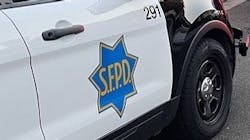Proposal Would Bar San Francisco PD from Making Pretextual Stops
San Francisco police may soon be prohibited from stopping drivers for tinted windows, expired license plate tags and other low-level violations as part of a proposed policy overhaul intended to curb racially biased policing.
The draft policy, which was expected to be presented at Wednesday's Police Commission meeting, comes as the department continues to post striking racial disparities in the rates of people stopped and searched, despite substantial reform measures enacted over the last several years.
The proposal is intended to ban what's known as "pretextual" stops — when an officer pulls over a driver for a minor traffic violation as an excuse to search them for items like drugs or guns. While police say pretextual stops have helped officers confiscate dangerous contraband, the tactic has been criticized by criminal justice reform advocates as a driver of disproportionate arrests for Black people.
Police Commissioner Max Carter-Oberstone, who is hammering out the new guidelines alongside Police Chief Bill Scott, said racial disparities were most pronounced in stops for "ticky-tack offenses that don't have any real public safety implication." These infractions include things like having a broken taillight or fuzzy dice hanging from a rearview mirror.
Officers rely almost entirely on their own discretion in enforcing such equipment violations, Carter-Oberstone said, which is different than responding to calls for service or crimes in action.
One solution, Carter-Oberstone said, could be to limit that discretion, which can lead to police bias.
"Step one is to say, 'Here are a list of low-level traffic offenses. ... These are offenses that pose no threat to public safety,'" Carter-Oberstone explained. "We're just going to say, 'From here on out, police officers cannot make a stop to enforce these offenses.'"
In a statement, Scott said the Police Department was committed to reviewing existing policies, like the one on traffic stops, "and propose revisions that address disparities and bias policing."
"Addressing traffic enforcement and limiting (pretextual) stops with a balance of carrying out public safety duties is critical to breaking any potential patterns of bias policing and impacts to communities of color," Scott said.
The amended policy would still allow police to enforce vehicle offenses — just not by stopping motorists in the moment. Police could still send a ticket to someone in the mail or leave one on a parked car.
Exceptions would also be made if the person in the car matches the description of a violent suspect or is wanted for a crime.
"This is not about stopping enforcement," Carter-Oberstone said. "It's about limiting unnecessary interaction between law enforcement and citizens."
Tracy McCray, acting president of the San Francisco Police Officers Association, said the city's officers "focus on behavior when making traffic stops to enforce the vehicle code, not anything else."
"The reality is routine traffic stops can lead to removing illegal guns off of our streets and given the level of gun violence our city is experiencing; these traffic stops literally save lives," McCray said in a statement. "If the new policy prohibits our officers from enforcing traffic laws, more guns will be in the hands of criminals and there will be more pedestrian and bicycle riders injured."
Criminal justice reform advocates in San Francisco and around the country in recent years have enacted policies that limit police's use of pretextual stops. Los Angeles and Philadelphia have severely limited the practice, and San Francisco District Attorney Chesa Boudin prohibits prosecutors from charging cases where contraband is discovered through a pretextual stop.
Berkeley police have also eliminated many low-level police stops as part of a broader effort to reduce the type of police interactions that have been deadly for people of color.
The draft policy would additionally limit how police can search or question people, and ban stops for people for certain crosswalk or bicycle infractions.
After Wednesday's meeting, commissioners are planning to hold public listening groups, weigh input from the department and the Department of Police Accountability, and potentially take a vote on the proposal by fall.
___
(c)2022 the San Francisco Chronicle
Visit the San Francisco Chronicle at www.sfchronicle.com
Distributed by Tribune Content Agency, LLC.
